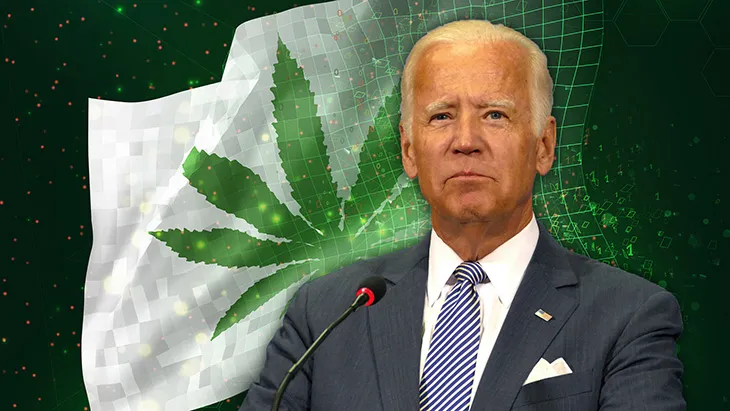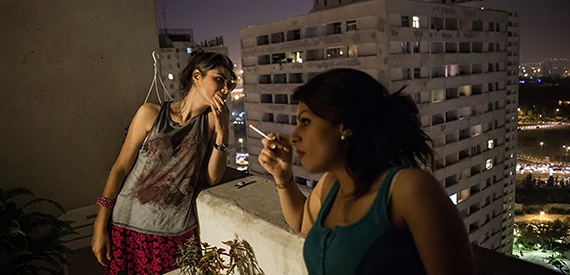Image via
President Biden announced yesterday that he’s pardoning Americans charged with “simple possession” of cannabis under federal law, the AP reports. This is a huge step for the administration, as it’s effectively paving a path toward cannabis decriminalization, and obviously addressing the racist charging practices that disproportionately impact people of color.
This move will also directly impact thousands of people who have been convicted of simple possession of cannabis in Washington DC, where weed laws are wonky as fuck. Technically, the plant is federally illegal, and DC is a federally owned “district” — not a state. So, weed remains illegal there, despite numerous legalization attempts. Biden is calling on governors to issue similar pardons for those convicted of state marijuana offenses, which reflect the vast majority of marijuana possession cases.
In a statement on Twitter, Biden said the move reflects his position that “no one should be in jail just for using or possessing marijuana.” The Tweet reads, “Too many lives have been upended because of our failed approach to marijuana. It’s time that we right these wrongs.”
According to the White House, however, no one is currently in federal prison solely for “simple possession” of the drug. That means many people who don’t deserve to be in prison, say for non-violent crimes, will remain there. It also means people facing federal charges of which cannabis is a part will not be pardoned from their cases. Still, the pardon could help thousands overcome obstacles to renting a home, getting into college, or finding a job.
“There are thousands of people who have prior Federal convictions for marijuana possession, who may be denied employment, housing, or educational opportunities as a result,” he said. “My action will help relieve the collateral consequences arising from these convictions.”
It should be noted that pardoning simple possession doesn’t cover convictions that involve other drugs. It also doesn’t cover charges relating to growing or possessing cannabis with an intent to distribute. That’s where this decision draws, in our opinion, a discriminatory boundary, ultimately making it a C+ effort. Biden is also not pardoning non-citizens who were in the US without legal status at the time of their arrest.
The announcement marks Biden’s reckoning with the impact of 1994 crime legislation that he championed. It basically increased arrest and incarceration rates for drug crimes, particularly for Black and Latino people.
The Department of Justice is working to create a process for who are impacted by Biden’s pardon to receive a certificate of pardon. That way, there is specific paperwork they can show to potential employers and others as needed.
“The Justice Department will expeditiously administer the President’s proclamation, which pardons individuals who engaged in simple possession of marijuana, restoring political, civil, and other rights to those convicted of that offense,” the department said in a statement. “In coming days, the Office of the Pardon Attorney will begin implementing a process to provide impacted individuals with certificates of pardon.”
Biden is also calling for the secretary of Health and Human Services and the US attorney general to review the scheduling of cannabis under federal law. Rescheduling the drug would reduce criminal penalties for possession.
The AP says rescheduling cannabis could possibly eliminate criminal penalties, but that would require descheduling it entirely from the CSA’s list of controlled substances. But based on a 2021 White House briefing, Biden seems to mostly be interested in reclassifying cannabis from a Schedule I drug (where it sits alongside heroin, LSD, MDMA, DMT, Peyote, mescaline, psilocybin, etc) to a Schedule II drug (where weed would sit next to fentanyl, cocaine, and methamphetamine). Based on what we know about the drugs in the Schedule II category, eliminating criminal punishments is not likely. The White House also didn’t set a timeline for a scheduling review.
Advocacy groups praised Biden’s historic announcement. “This is incredibly long overdue,” said Kassandra Frederique, the executive director of the Drug Policy Alliance. “There is no reason that people should be saddled with a criminal record — preventing them from obtaining employment, housing, and countless other opportunities — for something that is already legal in 19 states and D.C. and decriminalized in 31 states.”
Will governors follow Biden’s lead? Erik Altieri, executive director of the National Organization for the Reform of Marijuana Laws, said extending the action to states could help millions of Americans. “Since 1965, nearly 29 million Americans have been arrested for marijuana-related violations — for activities that the majority of voters no longer believe ought to be a crime.”
Chris Goldstein, 46, was arrested after smoking half a joint during a marijuana legalization protest at Independence Hall in Philadelphia in 2013. He paid a $3,000 fine and spent two years on probation.
“As someone who voted for President Biden, I’ve been expecting this from the first day he came into office,” Goldstein said. “This was a campaign promise.”
As a writer and activist who has been public about his conviction, he’s not sure that his criminal record was an obstacle to him getting a job, but he knows that it shows up in his background checks. And he’s shied away from visiting other countries because convictions can complicate international travel.
“I’m thrilled, and everyone like me is going to be just as thrilled,” he said.
It will be interesting to see how this all shakes out, particularly as we stare down a massive election on Nov. 8th.











